Part 15: (bonus): Jewspeak Part 1
This LP just wouldn't have been the same without the thread that accompanied it. Ergo, the thread that accompanied it must be saved for posterity. You can find all kinds of information on Jews and Judaism directly or tangentially related to the game here, and it turned out to be so lengthy I had to break it in two parts. Once again thanks to everyone involved in the discussion!The first part touches on Adon Olam, Yiddish translations, the Interfaith marriage, the Torah used in a synagogue, membership fees, antisemitism, the Orthodox/Conservative/Reform divide, and the possibility of mercy.
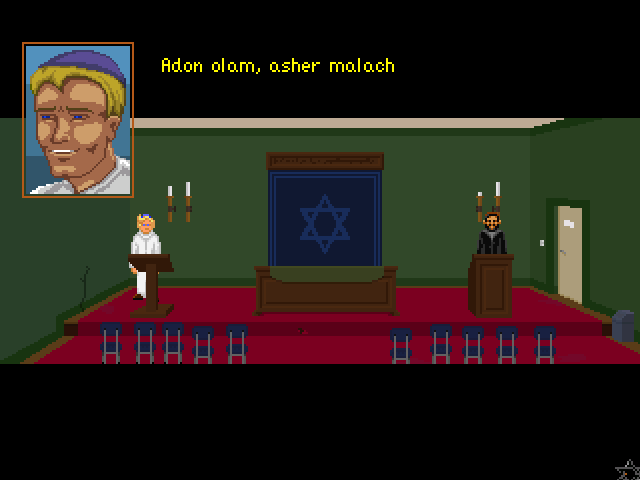
Patter Song posted:
For all those people talking about Adon Olam earlier, which is your favorite tune for it?
http://zemirotdatabase.org/view_song.php?id=23#rec
This lists some of the more popular one. I always grew up with the first one (their recording isn't very good) and it's still my favorite.
Fishbait posted:
The first three were all used at some point at the conservative congregation we belonged to. The only time we got really unusual ones was on Saturday mornings, during the bar/bat mitzvah prep classes. The kids who were getting ready for their own ceremonies would be led through the service by high school students, so that they would know the prayers. Predictably, they got bored as Hell and would use just about anything. The one I really remember was the time they used Centerfold.
loquacius posted:
The two I heard growing up were the first one and the second-to-last one minus all the stupid "ding dong doo-doo-doo" crap the nasally pseudo-singer guy threw in for no reason, but Adon Olam can easily be set to a ridiculous number of tunes. I had a Hebrew School teacher who was fond of setting it to Rock Around the Clock; Hymn 43 by Jethro Tull is an especially meta choice; I've heard of some Internet Person somewhere setting it to Deutschland Uber Alles for added irony value but I don't even know how that song goes so I dunno how well it works. vv
Patter Song posted:
aDON Olam ASHer MAlach BEterIM kol YITzir niVRACH!
...It works pretty well.
Captain Capitalism posted:
The recording my temple used isn't in there, but it probably wouldn't have flown in an Orthodox shul (We were conservative). It was too happy sounding.
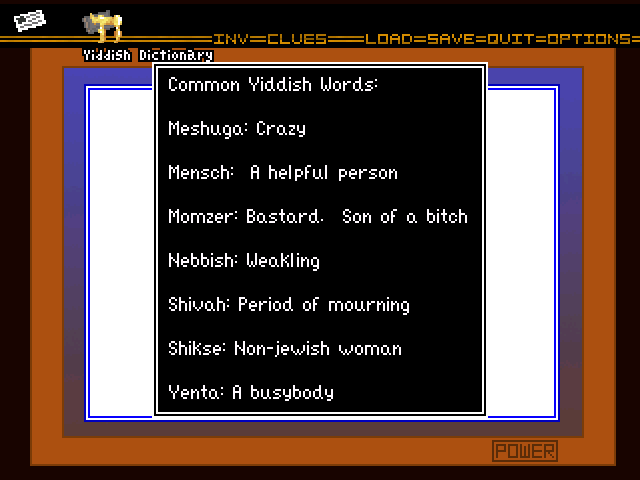
Viola the Mad posted:
I'm a little antsy about some of those Yiddish translations. A nebbish isn't a weakling, he's this neurotic guy who freaks out over every little thing (think any protagonist from any Woody Allen movie). A mensch is a wonderful person with great integrity and kindness, someone to really emulate. Every mama wants their son to grow up into a mensch.
And a shiksa is a flat-out slur for non-Jewish women. When I've encountered the term, there's this sort of implied sense of competition--this fear that Jewish boys will run off and marry her, or will keep her as a mistress on the side. It's left over from the days when intermarriage was much more a taboo than it is today. Nowadays a lot of Jews consider the term very offensive and don't use it. I'm a little embarrassed to see the game use the word.
Viola the Mad posted:
Yiddish is a Germanic language and shares quite a few words with German (probably grammatical structure as well, but I don't actually speak the language). Anyone who has studied one will likely find a lot of similar words in the other, though as we saw here they may not have the same meaning. I can think of at least one newspaper announcement that mistook Yiddish for German (albeit a very, very old one), and many 1800s intellectuals including Jews struggling with the so-called "Jewish Problem" rejected the language as a corrupted German jargon that was not a true language. I once surprised a German acquaintance by insisting that smoked salmon really ought to be called lox; apparently the word for salmon in German is "lachs."
People also commented on my definition of the word "shiksa" and its relation to intermarriage in the Jewish community. Sufficed to say it's a long and complicated story that still evokes a great deal of ambivalence today. However, I stand by my assertion that shiksa is generally viewed as a slur (at least in the American Jewish community). While my mother has made it very clear that she wants Jewish in-laws and Jewish grandchildren to my brother and I, she would never refer to my brother's non-Jewish girlfriends as a shiksa.
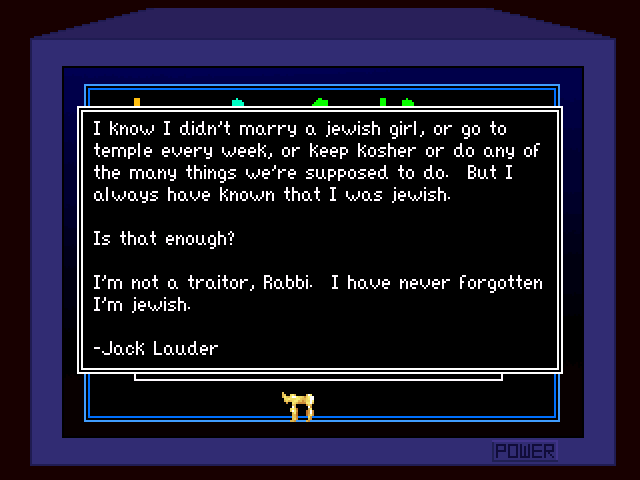
Viola the Mad posted:
Before I get started, I should note that I am most familiar with the history of Ashkenazi Jews, in particular American Ashkenazi Jews. The Jewish people are a very diverse bunch with a very long history, so it's safe to say that there have been a lot of exceptions to some of the historical generalizations I'm going to make. If I leave anything important out, by all means speak up.
INTERFAITH MARRIAGES IN THE JEWISH COMMUNITY
It's safe to say that there have always been interfaith marriages as long as there have been Jews. An assortment of Israelites in the Bible are described as marrying outside the faith. However, the Bible repeatedly forbids marrying Canaanite women, on the grounds that they will seduce your sons from the one true path, and then your grandchildren will grow up to be idol worshippers, etc. As far as I know, Rabbinic law spread the ban to all non-Jews.
For the vast majority of its existence, Judaism has existed as a minority, and a frequently persecuted one at that. Under such circumstances, marrying outside the community was tantamount to conversion. In addition, Jews frequently lived in their own quarter and socialized primarily with each other. Such social isolation was exacerbated by discriminatory laws, most notably the establishment of ghettos across Europe towards the end of the Renaissance era. While intermarriage undoubtedly took place before the modern era, particularly in more tolerant periods and locations, it was probably fairly rare and with major social consequences beyond getting kicked out of your synagogue.
Cut to the 1800s. With the advent of the Napoleonic era, the Jewish community began to integrate into the general society. Emancipation shattered the semi-autonomous traditional Jewish community and essentially provoked a massive identity crisis and people struggled to find a way to be Jewish and modern. Widespread antisemitism also created major barriers in the lives of all such modern Jews. It is under these conditions, particularly the way they shaped American Jewish life, that what I call the shiksa archetype emerged.
I said earlier that the word shiksa is a nasty slur, but I really can't think of any other alternative. The shiksa archetype isn't just a non-Jewish woman, or even a non-Jewish spouse. Her non-Jewishness makes her this beautiful, exotic creature, and she implicitly provides her Jewish boyfriend with a ticket into general society. For example, in The Jazz Singer, whose plot is driven by the Jewish-or-modern struggle, the Jewish main character's relationship with the non-Jewish Mary Dale is one of the major signs both for the audience and the movie's characters that he has rejected traditional Judaism for assimilation into secular society.
Because Jewish men played a big role in the creation of modern American pop culture, the shiksa archetype shows up a lot in American media, and unfortunately it often goes with negative stereotypes of Jewish women. Case in point: Keeping the Faith. Note how the Jewish women the rabbi dates are these obnoxious JAP shrews, while the non-Jewish heroine is this beautiful blonde girl who is *just perfect* for him. God I hate that fucking movie.
But let's get back to real life. As the shiksa archetype implies, marrying a non-Jew in earlier generations was the ultimate step towards assimilation. Some families would cut off relations and actually hold a shiva for a member who married outside the faith. But even in this period I doubt marrying outside of the faith would have caused a complete separation from the Jewish people. The advent of cultural Judaism gave people a path to identifying ethnically as a Jew, even if they weren't religious. And, as this game shows, even if you got thrown out of the synagogue, you could always find another.
Today, nearly half of all Jews marry non-Jews, so interfaith is less a taboo and more a frustrating conundrum. Expelling or ignoring all those couples would deal a serious blow to the community. We need to keep them in the tribe. And most people do not consider the accident of love to be grounds for excommunication anymore. That said, such a high level of intermarriage is rather alarming. There's this lingering worry that the Jews will assimilate out of existence, and naturally intermarriage is a rather troubling sign. Some Jews will only date other Jews. Others will date non-Jews, but plan to marry another Jew eventually. And some don't care. Parents who identify strongly as Jewish usually want their kids to marry inside the community; still, I'm willing to bet that the majority would accept non-Jewish spouses.
Currently, the big question is how to deal with interfaith families. Should a rabbi perform a Jewish wedding for interfaith couples? While synagogues in general will accept the couple, I'm willing to bet that most rabbis would have serious reservations at the least about performing a wedding. Should Judaism be patrilineal as well as matrilineal? Reform Jews say yes, but everyone else says no. Should people be allowed to convert only to marry a Jew and not for love of the religion? The jury is still out (and probably won't decide any time soon). Should non-Jewish parents be able to take the customary aliya at their child's bar/bat mitzvah? Some say no, not at all; some say they can't take the aliya, but they can accompany their spouse when s/he takes it instead; and some say yes, of course they can. There are probably some jerks who say that a non-Jewish parent shouldn't attend their child's bar/bat mitzvah, but those guys can go fuck themselves. As long as we're on the topic, how do you raise your children to be Jewish in an interfaith family? And so on. Judaism is very decentralized, so there probably won't be a definitive answer any time soon.

Patter Song posted:
Beth Tikvah..."House of Hope" sounds like the sort of name you'd give a Reform synagogue. (Forgive me if I'm screwing that up...haven't really been exposed to Hebrew in a long time, but I'm pretty sure that's what it means.) I have a feeling that after leaving Stone's apparently Conservative/Conservadox (he's definitely not outright Orthodox) shul, our man Lauder wanted to stay in the faith but in a more lax one.
Sutureself posted:
My grandparents went to a Beth Tikvah temple, I guess it's a fairly common name for a Reform or kinda-Reform temple.
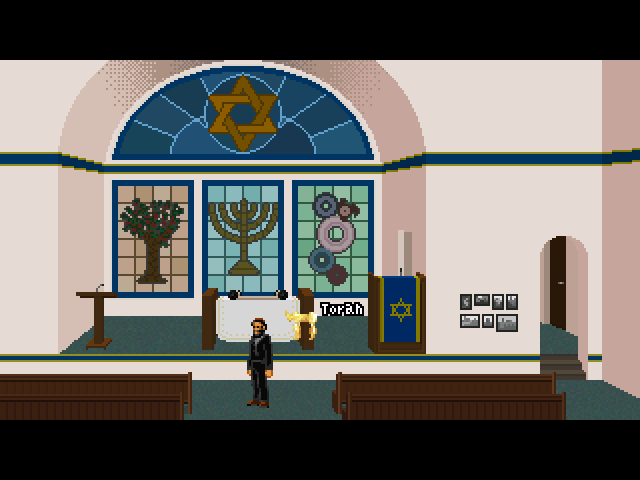
 I can't believe they're just leaving it here for anyone to come in and take it.
I can't believe they're just leaving it here for anyone to come in and take it. They must have dozens of them in a back room somewhere.
They must have dozens of them in a back room somewhere.Kraps posted:
Actually, many of the larger Orthodox/Hasidic synagogues in Brooklyn do have some form of stained glass windows, but the colors and designs are much more muted compared to regular stained glass windows and are possible to miss unless you look directly at them.Xander77 posted:
That stained glass window surprised me. You're not going to see one of those in an Orthodox synagogue.
loquacius posted:
Zelig and his temple seemed very familiar to me compared to Stone, which makes sense since Zelig is just a rabbi and not a nihilistic noir antihero. Where's the Ark in that temple, though? Do they just always keep the Torah on the table like that? They should probably have an eternal light, too, but the Ark is what's really bugging me here since they need to put the Torah somewhere when they're not reading from it.
Regarding conservatism / Reform: I sometimes think Judaism should have a few more subsets like Christianity does, because the existing ones have come to mean almost nothing. I've been to Reform synagogues that are basically indistinguishable from the relatively liberal Conservative synagogue I grew up in; I've also gone to a Bar Mitzvah in a Reform synagogue in Arizona that set its hymns to acoustic guitar and bongos, complete with dance circles, and had a break halfway through the service so the congregation could go use the meditation garden. The rabbi was wearing Birkenstocks; I am not exaggerating. What I'm getting at here is that there's quite a bit of variance within sects of Judaism.
Sutureself posted:
I loved the update, and the rabbi-off, but I doubt the temple has dozens of Torahs stored away, don't they cost like 5-10k each? I guess it could be Rabbi Stone's bitterness showing.
The White Dragon posted:
I don't know about 5-10k, Ebay sells a copy of the Torah for like $35. Maybe we're thinking of two different things, though.
vdate posted:
From what I recall hearing about them, not all Torahs are created equal, as it were. I seem to recall the kind necessary for ritual use having some absurdly time-consuming standards required in their production- handwritten on parchment or calfskin, with a dipped pen or quill by a trained scribe without any transcriptional errors, or some such. The book kind are likely a lot cheaper to make since they're not handwritten scrolls, but as such they're also likely no good for ritual use.
Captain Capitalism posted:
The Torah in a shul (or temple, or synagogue, however you want to say it) is a Sefer Torah, which follows some pretty strict construction rules:
1) All parchment, bindings and the quill must come from kosher animals.
2) The sefer torah consists of 304,805 letters, every one produced by a hand dipped quill in ink. You cannot make any mistakes, this makes the torah unusable. This can take around a year and a half to complete.
2b) However, there are a few ways around the "no mistake" clause:
quote:
Some errors are inevitable in the course of production. If the error involves a word other than the name of God, the mistaken letter may be obliterated from the scroll by scraping the letter off the scroll with a sharp object. If the name of God is written in error, the entire page must be cut from the scroll and a new page added, and the page written anew from the beginning. The new page is sewn into the scroll to maintain continuity of the document. The old page is treated with appropriate respect, and is buried with respect rather than otherwise destroyed or discarded.
3) A Torah can not be thrown away. It must be buried with respect.
4) Luckily, completing a sefer torah is one of the 613 mitzvot, so there's that.
Patter Song posted:
Also, about that 613 Commandments thing and others like it: the Torah isn't exactly the most obvious lawbook. It's vague and its commandments are bizarre and contradictory. That's why Judaism, despite its veneration of the Torah, is a two-holy book faith! Judaism venerates the written tradition that God supposedly gave to Moses (the Torah), but also holds to an oral tradition that was codified later. This tradition, best known as it's seen in the Talmud, explains in intricate, painstaking detail what each verse in the Torah actually means and what its implications are for how one should actually live his/her life. The Talmud is actually a compendium of hundreds of rabbis' opinions on these matters over the course of hundreds of years, and is really a lot like reading a series of Internet threads. "Rabbi X said A, but Rabbi Y said B. Rabbi Z said both of them were crazy and that Q is clearly correct." Furthermore, even the Talmud has its own commentaries. I'm pretty sure if was only Moses Maimonides (Orthodox Jews/rabbinical students call him RAMBAM, as part of a tradition to give all famous rabbis bizarre, silly acronyms) in the 12th century that finally numbered the laws of the Torah to 613 and listed what they were, as part of his famed commentary on the Talmud.
Xander77 posted:
So if you ever wonder about those jokes where Moses nags god until he turns the relatively simple "Don't cook a kid (goat) in its mothers milk" into the main focus of the Jewish dietary restrictions, with separate dishes and cooking practices - the Talmud is the place to go.

The Saurus posted:
Hold on, you have to pay membership fees to go and worship at the temple/synagogue?
Patter Song posted:
I can't attest for the synagogue in game, but the fee is likely not for actually going to services, but for the various other services the shul (congregation) provides: Bible study classes, Jewish literature clubs, community service projects, Jewish movie nights, all the other traditional "churchy" social activities, as well as possibly guaranteeing preferred seating in the front during High Holiday services (with the best rows in the synagogue guaranteed members only). I highly doubt there's a shul in the US that'd go, "You haven't paid for membership this year, you can't go to Shabbat services."
Iunnrais posted:
By the way, going back a couple pages when someone complained that synagogues sometimes have membership fees?
You know how at churches they pass a collection plate on sunday? Now imagine if your g-d told you that you couldn't touch money on your holy day when everyone shows up for service. Then imagine how soon those churches would have their electricity shut off if they didn't have another way of collecting money.
The idea of subtly suggesting to people that it would be nice to contribute to their religious services financially on a day that they're not forbidden to touch money would probably show up pretty quickly.
This doesn't mean that you have to be a member to show up on shabbat, just like priests don't kick people out of churches when they ignore the collection plate.
Then there's that thing called antisemitism.

The Saurus posted:
Since this is the place to discuss Judaism, I was trying to find out why antisemitism developed into something specific rather than "heretics/killed jesus" which it originally was. (Couldn't find out so if anyone knows)
Patter Song posted:
The common academic distinction is between Anti-Semitism (a racial hatred arising in the 19th century) and Jew Hatred (a traditional religious phenomenon that dates back much, much further). Anti-Semitism revolves around things like fear of Jewish manipulation of politics and finance, Jewish "contamination" of racial purity, "assimilated" Jews as something like undercover agents of an alien menace, etc. Jew Hatred revolves around the blood libel (that Jews use Christian blood to make their Passover Matzah), the "deicide" accusation (Jews killed Christ), and other such traditional folk beliefs. A Jew hater might believe that Jews have horns (hell, even Michelangelo thought so), an anti-Semite would probably laugh at the notion.
Obviously there's overlap and between the two (many anti-Semitic tropes like the fear of assimilated Jews and Jewish contamination of bloodlines can be seen in the decidedly premodern Spanish Inquisition), but anti-Semitism as we know it now is a direct product of modernity and industrialization.
The Saurus posted:
Any chance you can address the second point? Who are these guys? Are there a lot of people like them? It's not even the more obvious "dangers against us" that worry me, it's the in development sections of the jewish establishment, jewish traitors and "pseudojudaism". That pretty much declares anyone except you as leader, and anyone who doesn't do what you want as the enemy.
Like I said, I'm shocked because I've never experienced anything like this before, all my experiences with jews they've been nothing like this, and like the article said, secularism is very high and I imagine liberal believers make up some of the rest.
Patter Song posted:
Just so you know, you're risking a detour into Israeli domestic politics, which inevitably leads to I/P, which inevitably leads to terrible threads. I'm going to stay off that subject except to point out that the secular/religious divide is, in Israel, one of the two main poles of politics (along with the hawk/dove divide) and there is tremendous anger on both sides. The secularists resent that the ultra-Orthodox are exempt from mandatory military service and that they have government subsidies for their religious studies, while the ultra-Orthodox resent that Israeli life doesn't shut down for the Sabbath and other such issues. Up until the 1970s, the very religious tended to be anti-Zionist, nowadays, while the ultra-Orthodox anti-Zionist movement isn't dead, it's very much in the minority and many of the most passionate settlers are very religious.
American Jewry tends to be overwhelmingly Reform or Conservative. It's possible to find Orthodox Jews outside of New York City, but you have to look...Orthodox Jews, by necessity, all live within walking distance of their shul, so you'll have one neighborhood in a city that's 100% Orthodox and then none of them in the entire rest of the city). Within factions, there's pretty tremendous differences. An average Reform synagogue will run the range from full-blown atheists to decidedly pious people that go to services every week but strongly believe in not turning Jews into aliens within their society (Reform Judaism used to be even more secular than it is now...in the last few decades, it's moved steadily to incorporate more and more Hebrew and traditional customs). Reform Judaism was sort of founded as a backlash against the old-school rabbinical establishment holding Judaism back from modernity, and in the 19th century was a pretty radical movement, and that whole-hearted embrace of modernity has remained and colors the theology of its more loyal adherents. (In the 19th century, there was even a Reform effort to ditch Kol Nidre, the prayer said the night before Yom Kippur, as its message of "forgive all of the promises we wanted to keep but were unable to" was used as anti-Semitic propaganda saying that Jews used it to justify breaking contracts)
Conservative Judaism, probably the "mainstream," encourages people to keep Kosher but doesn't demand it, will reluctantly make concessions to cultural shifts (female rabbis etc) but doesn't eagerly embrace them like Reform does (If you want a gay wedding presided over by clergy, call your local Reform synagogue). The more traditional Conservative synagogues have the nickname "Conservadox." Conservative Jews might cover their heads in a secular setting, but it's definitely not expected of them and is a personal choice.
One group many Jews are intimately familiar with and most non-Jews haven't heard of (and they're huge lightning rods) are the Chabad Lubavitchers. The Lubavitchers are a popular Orthodox sect that followed Menachem Mendel Schneerson, an Orthodox Rabbi considered by many to be the Messiah. The Lubavitchers make a big push to try to take secular or lapsed Jews and bring them back into the observant fold, and will get your contact information and practically hunt you down to get you into religious activities. They tend to be unpopular among the rest of Judaism for practicing a sort of intrafaith conversion, poaching Reform and Conservative Jews and bringing them into the Chabad fold. Many Lubavitchers still consider Rabbi Schneerson the Messiah, despite his death in 1994, and claim that he will eventually return.
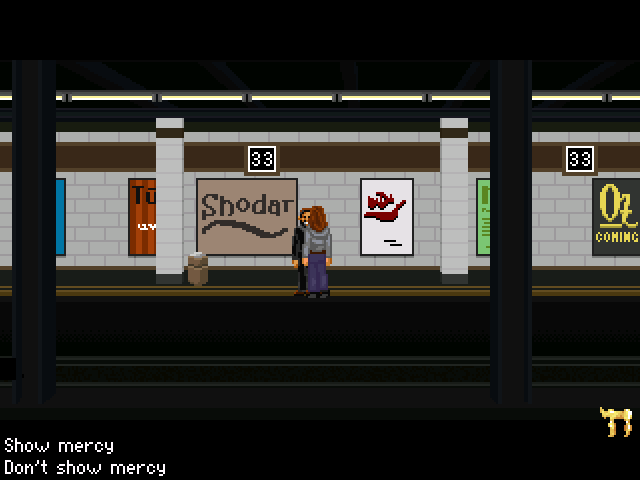
Showing mercy to DeMarco - would that be a proper thing to do?
Patter Song posted:
From Makkot (the fifth tract of the book of Nezikin in the Mishnah and Talmud), chapter 10:
quote:
I) If one fled after having been convicted at a court and again comes up before the same court, the [first] judgment is not set aside.
1) Wherever two witnesses stand up and declare, "We testify that so and so was tried and convicted at a certain court and that so and so were the witnesses" the accused is executed.
2) [Trials before] a sanhedrin are customary both in the land [of Israel] and outside it.
3) A sanhedrin that executes once in seven years, is called murderous.
1) Rabbi Eliezer b. Azariah Says: once in seventy years.
2) Rabbi Tarfon and Rabbi Akiva say: "Had we been members of a sanhedrin, no person would ever be put to death.
3) Rabban Shimon ben Gamaliel remarked: "They would also multiply murderers in Israel."
Looks like Shimon ben Gamaliel would have us throw him on the tracks, while the others would have us show mercy.
Patter Song posted:
Elisha didn't kill the disobedient children, though, God did (through the bears). Human life is a present given by God that can be removed by God. For men to presume to take that power onto themselves outside of a war situation or a properly-determined court is blasphemous. Remember Abel's blood crying out from the ground.HoldYourFire posted:
Our God is a vengeful God! Kill him! Have we forgotten "Go up, thou bald head"?

What about Zelig, then?
Iunnrais posted:
Scripture and history has shown again and again what to do with a leader who betrays his people and his g-d.
Zelig must fall.
berryjon posted:
But can we redeem him? Get him to atone? Of what use is punishment without the hope of forgiveness? Of what use Hell, without Heaven?
Iunnrais posted:
Perhaps Stone can be as the Baal Shem Tov. Perhaps the spark of light can be found in Zelig. But Zelig so far has shown himself to be an Esau (yesterday's parashah!).
Esau was a hunter of men, who despised his grandfather Avriham's kindness. He wanted Nimrod's birthright instead, and on the day of Avriham's death, killed Nimrod and took his kingdom. As his family was mourning, he found his brother cooking the ceremonial mourning meal and demanded it for himself, spitting on his heritage and his family.
Sound familiar? Has Zelig not done these things and worse?
Now, Yaakov did not kill Esau, granted, but neither did he allow Esau to spiritually lead the family. I'll back off on bloodthirstiness, but going down doesn't have to mean kill. Zelig needs to be removed from any position of spiritual authority. And then he can find teshuvah.
Patter Song posted:
Iunnrais, the same Esau whose brother would only give him stew when he was starving in exchange for his birthright? The same Esau had his fatherly blessing stolen from him under false pretenses, as his brother fiendishly conned his own father? The same Esau that after 14 years, buried the hatchet and embraced his brother as a brother? I've always thought that the Jacob/Israel good and Esau/Edom bad moral of that story is kind of corrupted by how (the admittedly rather dumb and impulsive) Esau is a legitimately better person than his conniving brother.
Tupperwarez posted:
Esau's Story: Beware the Siren Song of Fake Back Hair.
To be continued!